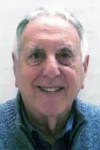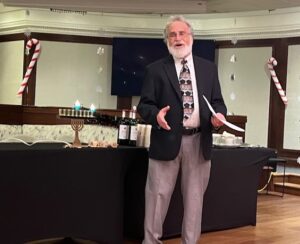By Donald H. Harrison


AT SEA, Aboard Azamara’s Onward – Rabbi Emeritus Gary M. Gans of Congregation Beth Tikvah of Marlton, New Jersey, has been leading Shabbat services and Chanukah celebrations on this Miami-to-San Diego cruise.
A life-long learner, Ham radio operator, ardent Zionist, Reconstructionist rabbi whose wife Ilene Schneider also is a Reconstructionist rabbi, Gans welcomed between 40 and 50 people to candle lighting ceremonies on the first night of Chanukah on Wednesday, Dec. 25, in the Cabaret Lounge, the ship’s main showroom. Azamara’s Onward had just completed a Christmas Day transit through the Panama Canal.
For the Chanukah celebration, Azamara Cruises thoughtfully provided latkes, sufganiyot, a chanukiah, and wine. It also printed prayer booklets devised by Gans. For safety reasons, open flames are prohibited in the cruise ship’s passenger areas, so Gans utilized an electric chanukiah with bulbs that twist on and off serving as candles.
In that evening’s service, the rabbi said that the 8-day holiday provides an important occasion for Jews to be together, emphasizing, celebrating and reinforcing their Jewish identity amid many reminders that they are in the minority in the predominantly Christian Western world. Christmas was much in evidence on our cruise ship with carols playing in the lounges, Christmas lighting, a special Christmas dinner, and some passengers wearing Santa hats and Christmas sweaters. Two candy cane decorations even served as a backdrop at our candlelighting ceremony.
A more serious challenge to Jewish identity came in 1980 when Gans and Schneider traveled to Moscow and Leningrad, Russia, to secretly celebrate Chanukah with Soviet Jews whose emigration applications then were being denied by the Communist government. The married rabbis surreptitiously transported tiny Chanukah menorahs as well as little Jewish stars as gifts to the Refuseniks. The couple also led Russian Jews in the recitation of Chanukah prayers and songs. All this might be taken for granted today, but in the Soviet Union in 1980 it was welcomed tangible evidence that Jews around the world cared for their Russian coreligionists.
Gans also noted that Jewish unity and continuity are particularly important in the Oct. 7, 2023, aftermath for the hostages captured by Hamas and for their families in Israel and across the world. A member of Gans’ extended family, Carmel Gat, was executed by Hamas after nearly a year as a hostage who had been confined to a tunnel in Gaza. Abducted from Kibbutz Be’eri, she was discovered by the IDF to have been slain with five other Israeli prisoners.
*
I interviewed Rabbi Gans, 73, near the onboard Mosaic Café, a name reflecting the tile work behind the counter from which pastries and beverages are served. I chose the spot because “Mosaic” in another context might have referred to Moses of Exodus fame and I’m a sucker for puns.
Gans grew up in a Conservative Jewish-affiliated home in northeast Philadelphia and was active in United Synagogue Youth and Camp Ramah. When he enrolled at Rutgers University, he majored in political science, thinking it might be a pathway to law school and perhaps a political career. However, the Six Day War in Israel in 1967 stirred his Zionist feelings, and he traveled to Israel in 1968 – the first trip of too many to count. In 1971, he studied for a year at Hebrew University in Jerusalem, taking an apartment with fellow Americans. A pair of Israelis accepted the American students’ invitation to become fellow tenants at subsidized rents in return for speaking only in Hebrew to them.
Back in the United States, Gans supplemented his bachelor’s degree at Rutgers with another bachelor’s degree in Jewish Studies from Philadelphia’s Gratz College.
Deciding to become a rabbi, he looked into the programs offered by the various denominations of Judaism, eventually choosing the Reconstructionist Rabbinical College in Philadelphia. The RRC offered a joint program enabling students to earn a master’s degree in a secular subject at another institution. Gans chose Temple University, where he earned a master’s degree in “psycho-educational processes,” which he described as “a complicated name for counseling and informal education.”
He met Schneider in 1973 when they were both speakers at a program for Jewish high school students. He was invited to speak about his trips to Israel. Schneider was invited to speak about what it meant to be a female rabbinical student – she would become in 1976 among the first six female rabbis to be ordained. She and two other women forged a path in the Reconstructionist movement. Three other women, including America’s first female rabbi Sally Priesand, likewise were ordained in the Reform movement. Two weeks after Schneider’s ordination, she and Gans were married. He was ordained three years later.
Both rabbis had grown up in hard-working, middle-class Jewish families that fostered their Zionist identities and “we found that reassuring,” Gans said.
Even before his ordination, Gans found work as a Jewish educator at Congregation Beth Zion-Beth Israel (BZBI), a Conservative congregation. When the senior rabbi had to undergo surgery, the lay leadership asked Gans if he could fill in for him the next Shabbat. “I didn’t realize that was meant to be my audition for a job,” Gans said. “It turns out that the following Monday they came into my office again, thanked me for the service, handed me a check, which I certainly hadn’t expected, as an honorarium for leading the service, and then said ‘we would like to create a position to keep you here.’ They created the position of associate rabbi and educational director.”
One day he officiated at a funeral in the morning and a wedding at night and decided he was ready to go out on his own. In 1981, he became the rabbi of Congregation Beth Tikvah in Marlton, New Jersey, serving in the pulpit for 35 years before becoming its rabbi emeritus.
“We were affiliated with the Conservative Movement, but the very progressive end of it,” Gans said. “We were the first congregation in South Jersey to count women and men equally in terms of responsibility. … I wanted to reach out to all genders and make them feel welcome. … Over the course of many years, we had a number of adult bat mitzvah classes for women who were denied that privilege when they were younger. It was very uplifting for them to be able to stand before the community and to be accepted as full Jewish adults, counted in the minyan, and to know that they were part of the future of this congregation.”
Furthermore, “I was always involved in interreligious communication,” Gans said. “One day on a weekend, I would speak at a local church and that same weekend, one of the local pastors or priests would speak on Friday night at my synagogue. That was part of our social action; we are now involved in a food bank with a local Lutheran church, and I have congregants who are very dedicated to that process.”
Even while serving as a pulpit rabbi and fostering two building campaigns, Gans looked for additional challenges. He obtained a doctorate in ministry from Eastern Baptist Theological Seminary, which later through merger became Palmer Theological Seminary in St. Davids, Pennsylvania. He also became a Ham radio operator – N2EEF – and picked up a reciprocal license on one of his many trips to Israel. On one memorable occasion, prior to Israel’s peace treaty with Jordan, he reached Ham radio enthusiast King Hussein of Jordan, who inquired where Gans was calling from. When Gans said “Jerusalem,” the king told him that communication between Israel and Jordan was against the law in both countries and then terminated the conversation. But still, Gans spoke with the monarch and never tires of telling the story in Ham radio circles.
Gans said people should retire to something, rather than from something. While planning for his own retirement, he was licensed as a family therapist. He also signed up as a chaplain serving the Marlton police force, accompanying officers who delivered news of unexpected deaths to family members as well as counseling officers who had witnessed traumatic events.
Another retirement pasttime is serving as a rabbi on cruise ships during Jewish holidays. As on this cruise, he conducts religious services and stands ready to provide counseling services to any passenger or crew member, regardless of religion, in times of crisis.
I interviewed his wife, Rabbi Ilene Schneider, who is a published mystery writer, separately. That interview will be the subject of an upcoming article.
*
Donald H. Harrison is publisher and editor of San Diego Jewish World.
Pingback: Rabbi Ilene Schneider Writes Murder Mystery Novels - San Diego Jewish World
Enjoyed that article. Thanks